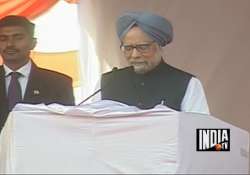PM Defends FDI Retail Decision, Attacks Oppn
New Delhi, November 29: Virtually rejecting demands from within UPA and outside for rollback of FDI in retail, Prime Minister Manmohan Singh on Tuesday justified the decision as a well considered move and attacked Opposition

New Delhi, November 29: Virtually rejecting demands from within UPA and outside for rollback of FDI in retail, Prime Minister Manmohan Singh on Tuesday justified the decision as a well considered move and attacked Opposition for not allowing Parliament to function.
He said there was no compulsion on states to implement the decision of the Union Cabinet with regard to allowing 51 per cent FDI in retail and there were options available to them for not implementing.
Dr. Singh insisted that the decision to allow FDI in retail was aimed at creating jobs, improving rumeneration of farmers and enabling import of technology besides benefitting consumers.
“I would .. like to a mention today of the decision of the government permitting Foreign Direct Investment in Retail. We have not taken this decision in any haste but after a lot of consideration. It is our firm convinction that the decision will benefit our country,” the Prime Minister said while addressing Youth Congress convention here.
He defended the decision taken last week even as Parliament was paralysed for the third day on the issue with Opposition, joined by UPA constituents Trinamool Congress and DMK, being unrelenting on the demand for its reversal. Voices of opposition have emerged from within Congress also.
“We believe that it will bring modern technology to the country, improve rural infrastructure, reduce wastage of agricultural produce and enable our farmers to get better prices for their crops,” Dr. Singh said, virtually ruling out any reversal of the decision.
Justifying the decision, Singh said the differential that exists between wholesale and retail prices will reduce and consumers will get commodities of daily use at reduced prices.
“As far as small retailers are concerned, the experience in some other countries suggests that both big and small retailers can easily co-exist in a big country like ours,” he said.
On the fears that the small businesses in the country would be hurt by the FDI decision, the Prime Minister said, “we have put some conditions so that FDI in retail promotes our small industry.”
Most importantly, he said, “we are not forcing anyone to follow this policy. State governments that are not convinced of its usefulness have the means to prevent foreign participation in retail businesses in their states.”
He said FDI in retail will result in creation of many new employment opportunities in a range of sectors like food processing, transportation, and storage. “I would urge all of you to inform the people correctly on the issue,” held told the Youth Congress workers.
Talking about the logjam in Parliament, Singh attacked the Opposition, saying disruption of proceedings amounted to doing “injustice” with those who have elected MPs and lowered the image of the country.
He said all differences can be discussed in Parliament and was “still hopeful of finding a way out of the current impasse” for which the government will continue its efforts. While talking about the government's endeavours to push reforms, Singh said, “the work we have to do requires the enactment of many new legislations and amendments in many existing ones.”
Singh said the government wants to take the legislative matters speedily before Parliament.
“It is necessary that Parliament functions smoothly if we are to move ahead. But the Opposition parties are not allowing this to happen in the current session,” he said.
The Prime Minister said government has always believed that “whatever differences of opinion the opposition parties have with us should be discussed and debated in Parliament.
“If we don't do this and create obstructions in the work of Parliament, we do injustice to the faith reposed in us by the people who have elected us as their representatives.” Bringing the work of Parliament to a halt, he said, “also reduces the country's prestige”.
Referring to the issue of price rise, he attributed it to a variety of factors, including domestic and international, and said the government was determined to deal with it.
Listing the factors, Singh said due to rise in global prices of commodities, government has to raise Minimum Support Price of farm produce which causes inflationary pressure.
Similarly, when international fuel prices go up, it has an impact on costs of other commodities, he said. “We have taken so many initiatives, including fiscal initiatives... We hope by these measures, inflation will come down,” Singh said.
“In the coming months we will redouble our efforts for ensuring that the fruits of development reach all citizens of our country, and especially those who have been left behind,” he said.
Observing that “we have still a long way to go”, he said, “It is no easy task to meet the challenges that face us.”